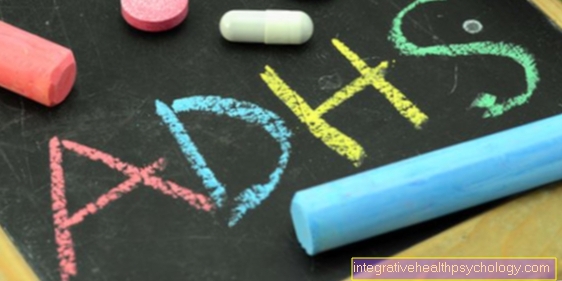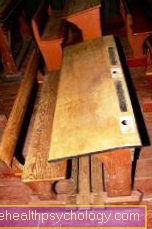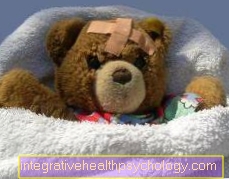
Attention Deficit Hyperactivity Disorder, Fidget-Philipp Syndrome, Psycho-Organic Syndrome (POS), Attention Deficit Hyperactivity Disorder
In contrast to the Attention Deficit Disorder Without Hyperactivity (ADD) includes that Attention Deficit Hyperactivity Disorder ADHD a possibly very pronounced inattentive and impulsive behavior.
In order to not provide impulsive children or adults with an ADHD diagnosis, a so-called observation buffer / observation period is provided in which certain behavioral patterns are shown.
That means, in order to prevent wrong judgments, the abnormalities should show up over a longer period of time, about six months in several areas of life (e.g. kindergarten / school, at home, leisure time) again and again in a similar or approximately the same form.
$config[ads_text1] not found
ADHD is just like ADS or a hybrid of the two clearly defined clinical picture, that through different symptoms is marked.
People with ADD or ADHD can have theirs Not targeting attention and thus show Deficiencies in the ability to concentrate on. The two forms vary greatly from one another: While ADD sufferers tend to behave introverted or even absent, people with ADHD turn up their impulsiveness. Both variants, but also the mixed form of both variants of attention syndrome, have in common that the lack of concentration usually affects all areas of life of the person affected.
In both forms of ADS there is one incorrect transmission and processing of information between the two brain sections (Hemispheres).
This, in turn, does not mean that those affected are less gifted, because people with ADHD may also be gifted. It is also possible that there are other diseases in addition to ADHD (see differential diagnosis below)
Since people or children with ADHD can only concentrate very unsteadily and in parts, their ability to build up attention is greatly reduced often other school areas are also affected by the problem, for example German and / or mathematics. So it is not surprising that many children with ADHD also have one LRS (= Reading and spelling weaknesses) and or Arithmetic weakness develop.
In what age The ADHD that is recognized depends on the person The form and severity of the symptoms.
In most cases, the children are in the for the first time early school days noticeable and teachers and parents become aware of the ADHD. Thus, most of those affected are diagnosed in early school age. Less conspicuous forms of ADHD, especially those without hyperactivity, can be overlooked and the diagnosis is often only made in adulthood, when the patient is under medical treatment due to accompanying problems.
The diagnosis of ADHD is seldom easy. As with all diagnoses in the field of learning, warnings must be given against a diagnosis that is too quick and too one-sided. However, this does not encourage one to be blinded and hopeful that the problems will grow.
IF there are problems, they should have appeared in various areas of a child's life over a period of about six months.
$config[ads_text3] not found
In addition to hastily categorizing the child, a warning must also be given against all negative phenomena and activities of the child with the comment “He / she just suffers from ADHD. Can't nobody help it ... ”to excuse me. Incorrect behavior in stressful situations or overactive behavior are classic manifestations, but one has to learn to classify and classify this behavior. In the end, many forms of therapy are only successful because they recognize, interpret and do not accept the behavior of children, but work specifically on changing established behavior.
$config[ads_text2] not foundPrecise observations are essential in advance - as already mentioned above - and should initially be assessed by the mother over a period of around six months, possibly - if there is a direct suspicion - recorded in note form. It is important that the people involved in the upbringing who express the first suspicion, after a certain period of time, “initiate” the others into the suspicion. One thing is certain: the observations must always relate to all areas of life (kindergarten / school, home environment, leisure time) in order to be able to make meaningful judgments and to consider further steps. In particular, teachers are in demand here, as abnormalities sometimes appear quite early on.
Diagnostics should always be comprehensive and therefore cover the following areas:
Read more: Therapy and help for children and adolescents with behavioral problems
$config[ads_text4] not found
With the child it is treating pediatrician responsible. Mostly express Teachers or parents the Suspected ADHD and initiate diagnostics.
The children may already be receiving treatment from a psychologist or psychiatrist due to psychological problems accompanying ADHD, in which case the diagnosis of ADHD is often made by the treating psychologist.
As the parents usually the most important caregivers of a child, they play an important role in the possible observation of their child. It is not always easy to recognize possible deficits and “norm differences” and, above all, to admit them.
It is important to know that children who undoubtedly have ADHD do not do so because parents may have made mistakes in their upbringing. ADHD is not the result of a deficit in upbringing, even if it often appears, but it can be negatively influenced by it.
The acceptance of the problems is an important aspect not only with regard to a more objective diagnostic assessment, but above all with regard to therapeutic success. Parents who accept the problem will presumably also be more positive about therapy for ADHD.

While the parents can describe and assess the domestic situation in a special way, the kindergarten or (elementary) school is responsible for assessing the educational area outside the home. Here are also available numerous opportunities for observation of an ADD child. Even if the educators and / or teachers observe and assess the behavior of the children, it is not up to them to make the actual diagnosis. The Observation results are, however, the basis for the most comprehensive possible diagnosis.
The actual diagnosis is made by the attending (pediatric) doctor, who will take further diagnostic measures in addition to the observation criteria provided by parents and school or kindergarten.
What does situation observation in school and / or kindergarten include?
On the one hand, the observations should be recorded in writing; on the other hand, all educators or teachers involved in the upbringing of the child should carry out these observations. In addition, a consistent and honest exchange with the parents and also a conversation with the school psychological service, possibly also with the supervising therapist, is very important. As already mentioned, parents must first have released the therapist or the educational counselor from the obligation of confidentiality.
$config[ads_text1] not foundOne possibility for recording an actual state from different perspectives is provided by the one named after its developer Achenbach scale. In addition to taking into account the age and gender of the child, it offers the option of using separate questionnaires for parents, educators / teachers and children to view the child's overall situation as objectively as possible. This always depends in a special way on the honesty of the people interviewed.
How and in what form a psychological report is drawn up varies and is particularly dependent on the age of the child. While with preschool children a so-called Developmental diagnostics is made, for (elementary) school children, among other things, a Intelligence diagnostics carried out. This has the advantage that any giftedness that is difficult to find out in everyday school life has the chance to be discovered. Both in the context of developmental diagnostics and in the field of intelligence diagnostics, attention is also paid to how the child behaves in the test situation. Further information on the subject of intelligence and intelligence diagnostics can be found in the section Giftedness.
It differs and as a rule depends on the authority issuing the expert opinion as to which diagnostic test procedures are used. Well-known methods for measuring intelligence, development and partial performance disorders are for example: HAWIK (Hamburger Wechsler Intelligenztest für Kinder), the CFT (Culture Fair Intelligence Test) and many more.
During the HAWIK via various sub-tests, such as: picture additions, general knowledge, arithmetic reasoning, etc. tests the practical, verbal and general intelligence, measures the CFT a child's individual ability to recognize rules and identify certain characteristics. It also measures the extent to which the child is able to grasp and solve problems non-verbally. This test also consists of different - a total of five - different sub-tests.
In addition to the intelligence measurement, there are various test procedures that measure the child's attention (e.g. DAT = Dortmund attention test), or the ability to solve problems and to concentrate.
A is currently in preparation special test for diagnosing ADHD. KIDS 1 was developed by Döpfner, Lehmkuhl and Steinhausen with the intention of using five different methods to obtain the most comprehensive diagnostic information possible, which also makes it possible to adopt an appropriate, individual line of therapy. The test can be used after the appearance of paediatricians, child and youth psychologists, as well as child and youth psychotherapists.

As mentioned above, a diagnosis should consist of many observation moments in order to be as meaningful as possible. This reduces the likelihood of a misdiagnosis, because not every lively, curious or extroverted child is also an “ADHD child”. The aforementioned bodies such as parents, teachers or educators and also psychologists play an important role in making a suitable diagnosis, but do not issue them themselves. Issuing the diagnosis “ADHD” is the task of the pediatrician in Germany.
$config[ads_text2] not found
In addition to the various observations and psychological test procedures are also used targeted examinations carried out. These are usually of a neurological and internal nature and are primarily aimed at excluding organic problems as the cause of the abnormal behavior.
It usually starts with a comprehensive one Blood count, among other things to rule out thyroid diseases, Iron deficiency, general deficiency symptoms etc .. Also one physical exam to exclude eye and ear diseases, allergies and their accompanying diseases (asthma, possibly neurodermatitis; see: differential diagnosis) will be carried out. .
As a rule, a medical diagnosis also includes an examination by means of an examination EEG (Electricencephalogram). This examination is used to register potential fluctuations in the brain and thus enables important conclusions with regard to functional disorders of the CNS (= central nervous system).
The EKG (E.lectrokardioGarmm) allows statements about the heart rhythm and heart rate, among other things. With regard to the diagnosis of ADHD, it is used to rule out cardiac arrhythmias that may require special medication or exclude certain forms of therapy.
ADHD questionnaires are there many. Various places have them Self-tests for adults, children, their relatives and for Teacher designed.
In these questionnaires the typical symptoms and side effects queried. How useful, serious and well-founded these tests are depends on the provider. Also is the appearance of ADHD too variableto from standardized tests reliably to be captured.
Consequently deliver these tests only initial indications of an attention deficit and cannot replace a doctor's diagnosis.
In adults, this is the diagnosis a little more complicated than with the child.
After years of symptoms, adults form Compensation strategies out, avoid situations in which their attention deficit becomes obvious and suffer more from social and psychological problems.
They are mostly aware of their illness unaware and write the symptoms therefore of your own personality to. Since the diagnosis is based on symptoms, which can be masked in adults, it is more difficult to make in adults.
Often there are patients due to comorbiditiese.g. Depression, under treatment and only then does the doctor recognize evidence of ADHD. If you suspect it runs Diagnosis similar to that of a child from. The doctor orients himself to the Guiding symptoms Attention disorder, impulsivity and hyperactivity and asks them in the patient interview and with questionnaires. Since these symptoms can express themselves very differently in adults, the Check doctor very carefullywho work through years of medical history and filter out any compensation strategies.
That too The environment and the family are interviewed, as they have known the patient since childhood and often several members of a family suffer from ADHD symptoms. Come to question the patient complementary testse.g. intelligence, behavior and also physical examinations to rule out other causes of the symptoms and narrow down the form of ADHD.
In adults, the diagnosis is made by the doctor who noticed or referred the symptoms of ADHD Patient turns himself. In most cases this is the attending family doctor or the Psychologist or psychiatristif the patient is already suffering from typical comorbidities of ADHD such as Depression is being treated.
The patient himself is seldom aware of his illness and is usually informed of this by the environment or the treating doctor. Due to the high risk of comorbidities, an examination by various specialists is recommended.
Diagnostic guidelines are based on the three core symptoms Attention disorder, Impulsivity and hyperactivity. For each of these symptoms there are typical appearances and examples that the doctor asks for.
In addition, the Symptoms have persisted since childhood and restrict the patient in several areas of his life. Ruling out other causes is just as important as recording the symptoms, since ADHD abnormalities can also occur in other diseases and even in healthy people.
As in the area of ADD and other areas, the problem of diagnosing “ADHD” lies in the fact that one tends to assign a supposedly “small” problem directly to a central learning problem. This means that children or adults can “simply” suffer from a lack of concentration. This is not always an ADHD. There are also various behavioral problems in children. Not least because of this, a differential diagnostic delimitation of the symptoms is necessary.
Based on the various diagnostic surveys, it is already clear that some areas specifically try to rule out other diseases. By means of various internal and neurological examinations, the doctor tries to exclude various metabolic disorders, visual and / or hearing disorders, neurological disorders through differential diagnosis and, in particular, to assign the actual cause of any existing states of exhaustion. Differential diagnostic diseases also include the exclusion of profound psychological impairments such as Tourette's syndrome, depression, anxiety disorders, mania, compulsions (tics), autism, Asperger's syndrome and bipolar disorders (= manic-depressive diseases). Only rarely does it happen that children suffer from one of the diseases mentioned in addition to ADHD.
In the cognitive area, reduced intelligence, partial performance disorders such as dyslexia or dyscalculia should be ruled out, as well as giftedness or partial poor concentration. In particular, if problems in reading and spelling already occur, the diagnostic survey to differentiate between dyslexia and reading and spelling weaknesses may be necessary. The same applies to problems in arithmetic and the distinction between the partial performance disorder dyscalculia and a weakness in arithmetic.
In terms of differential diagnosis, profound developmental disorders, affective disorders and a home environment that intensifies symptoms should also be differentiated.
Children and adults who suffer from ADHD find it difficult to focus on that Distractibility is immense. It is also noticeable that work that has begun is often not finished.
It is precisely at this point that the problems that a child with ADHD in particular can be exposed to in school become clear.
Even if the intelligence is in the normal, sometimes above-average range, those affected can overcome the deficits caused by a Poor concentration arise, cannot or only with great difficulty compensate. It is not uncommon to find one in children and adults with ADHD Reading and writing difficulties or Arithmetic weakness in front. The combination of ADHD and partial performance weaknesses (dyslexia or dyscalculia) cannot be ruled out.
So that those affected can be helped, the therapy of ADHD must be targeted.
Especially in childhood, blaming and insulting children does not change anything. On the part of parents and teachers, patience and, above all, (self) control are required. Consistent educational action, setting up and adhering to agreed rules is the top priority for children affected by ADHD.
A list of all the topics that we have published under our "Problems with Learning" page can be found at: Problems with learning A-Z